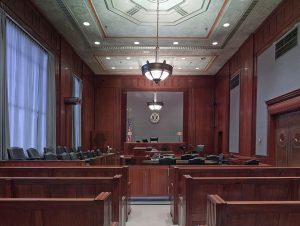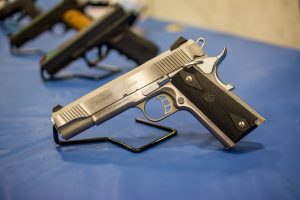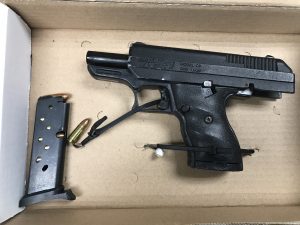 In a highly controversial decision at the Montgomery County Circuit Court in Rockville, a judge has ordered an alleged murder’s case to be transferred to juvenile court. The decision angered family members of the four victims, one of whom had died from gunshot wound injuries. The defendant was originally charged as an adult with one count of murder in the first degree and three counts of attempted first-degree murder in addition to various assault and firearm offenses for allegedly firing 16 rounds of ammunition into a crowd at a Germantown basketball court. The defendant, who is considered a respondent now that the case has been transferred, was accused to using a homemade polymer ghost gun to fire the shots. At the time of the incident he was just 14 years old, and now that the case has been transferred, he could be released from a secure juvenile facility in less than one year. The judge explained his opinion over the course of 30 minutes, and sided with the defense despite strenuous objection from the Office of the State’s Attorney.
In a highly controversial decision at the Montgomery County Circuit Court in Rockville, a judge has ordered an alleged murder’s case to be transferred to juvenile court. The decision angered family members of the four victims, one of whom had died from gunshot wound injuries. The defendant was originally charged as an adult with one count of murder in the first degree and three counts of attempted first-degree murder in addition to various assault and firearm offenses for allegedly firing 16 rounds of ammunition into a crowd at a Germantown basketball court. The defendant, who is considered a respondent now that the case has been transferred, was accused to using a homemade polymer ghost gun to fire the shots. At the time of the incident he was just 14 years old, and now that the case has been transferred, he could be released from a secure juvenile facility in less than one year. The judge explained his opinion over the course of 30 minutes, and sided with the defense despite strenuous objection from the Office of the State’s Attorney.
While the families of the victims have every right to be outraged by the decision, the judge was bound to follow the rule of law in Maryland, which has changed drastically in the past year. Any juvenile who is charged as an adult may petition to transfer the case to juvenile court. This has become known as a reverse waiver hearing, and the judges are required to weigh five independent factors including age of the child, the child’s physical and mental condition, the child’s amenability to treatment in a juvenile facility or program, the nature of the offense and public safety. In the past too many judges have focused on the nature of the offense, and if it was especially violent the transfer would be denied in the name of public safety. Pursuant to what is now known as the Davis case, judges are no longer allowed to make these swift, allegation based decisions. The Court of Appeals in Davis reiterated that the controlling principal of the justice system is protection of the public, and that a juvenile delinquency program that is most effective at treating, educating and rehabilitating offenders will best protect the public in the long run. Amenability to treatment has become the determinative factor when considering transfer, and the other four factors ultimately lead up to amenability. Amenability in this context is best interpreted as whether a child would benefit from a juvenile program. If the answer is yes, then the case should be transferred regardless of the underlying nature of the charges.
The defendant was originally charged as an adult because Maryland juvenile courts do not have original jurisdiction over individuals 14 and over who are facing charges that carry life in jail. The first-degree murder and attempted murder charges all carry life in prison, which means the juvenile court did not have original jurisdiction over the defendant. In most other cases a juvenile must be at least 16 before being charged as an adult, but for life felonies the minimum age is 14. All defendants who are between 7 and 13 years old will be charged as juveniles, and can only be prosecuted in adult court if their case is waived up at a discretionary waiver hearing. If your child is facing charges in any Maryland court contact juvenile criminal defense lawyer Benjamin Herbst anytime for a free consultation. Benjamin has successfully argued for the transfer of numerous individuals to juvenile court, including a recent armed robbery case where the individual had already turned 18. He has represented clients in every county in Maryland and is also an experienced federal criminal defense lawyer who specializes in firearm offenses and white collar crimes such as theft of government property and fraud. Benjamin is available 7 days a week at 410-207-2598 to discuss the defenses that may be available in your case.
 Criminal Defense Lawyer Blog
Criminal Defense Lawyer Blog








